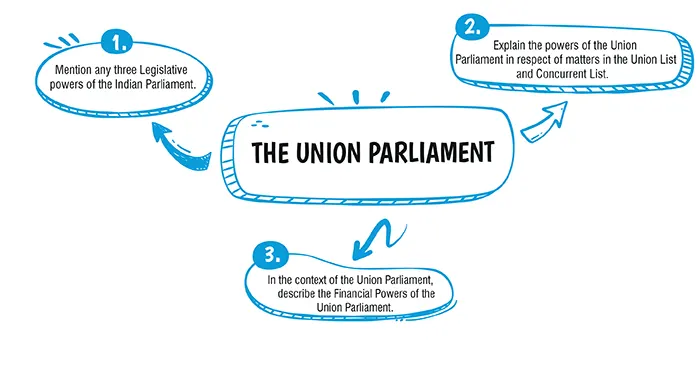Home / Board / ICSE / important Questions / Class 10 / History & Civics / The Union Parliament
Table of Contents

Ans.(c)
Explanation:
An adjournment motion is a parliamentary procedure that allows for the adjournment of the business of a legislative body, such as a parliament or a legislative assembly, for the purpose of discussing a definite matter of urgent public importance.
Ans.(b)
Explanation:
Money Bills originate only in the Lok Sabha. If a dispute arises as to whether a Bill is a Money Bill or not; the decision of the Speaker of the Lok Sabha is final. The Rajya Sabha has no power to reject a Money Bill.
Explanation:
The three Legislative powers of the Union Parliament are given below :
1. The Parliament is a law-making body and it is considered as the centre of all democratic political processes. It has exclusive powers to make laws on all subjects listed in Union List and Concurrent List.
2. The Parliament has power of financial control through budget discussion. For Example : Fiscal Policy.
3. It acts as an arbitrary power of other organs—Judiciary and Executive.
4. During a National Emergency, the union system of the government becomes a unitary one by granting Parliament the power to make laws on the 66 subjects of the State List. Also, all states. Money bills are referred to the Parliament for its approval.
Explanation:
Powers of the Parliament with Respect to matters in the Union List and Concurrent List :
(i) Union List : There are 97 subjects in the Union List. The Union List includes subjects of national importance like, defence, finance, foreign affairs, etc. Only the Union Parliament can make laws on these subjects.
(ii) Concurrent List : The Concurrent List includes subjects on which both the Union and State Governments can make laws. Along with the State Legislative Assemblies, the Parliament can make laws on the 47 subjects listed in the Concurrent List. If there is a conflict between the law enacted by the Parliament and the law made by the State Legislature with respect to Concurrent List, the Union Law will prevail.
Explanation:
Financial Powers of Parliament :
(i) The Budget : The Parliament passes the Annual Union Budget containing the estimates of receipts and expenditure of the government for a financial year. The Budget is presented in two parts, namely, the Railway Budget and the General Budget.
(ii) Supplementary Grants : If the amount authorised for the current financial year is not sufficient, the government may make a fresh demand known as the ‘Supplementary Grant’. It is also passed in the same manner as the Annual Budget is passed.
(iii) Votes on Account : If the Union Budget is not passed before the beginning of the new financial year, i.e., April 1, then there would be no money for the government to spend. There is, therefore, a device known as ‘Vote on Account’ which authorises the government to draw funds from the Consolidated Fund of India until the Budget is passed by the Parliament.
(iv) Fixation of Salaries : The salaries and allowances of MPs and Ministers are determined by the Parliament.
(v) Permission for Taxes : No tax can be imposed or money spent by the Government without the approval of the Parliament.
Download Mind Map of this chapter
Download NowWant to Practice Mock Tests of this chapter
Practice NowDownload Important Questions of this chapter
Download NowCBSE Important Questions Class 10
ICSE Important Questions Class 10
CBSE Important Questions Class 10
ICSE Important Questions Class 10